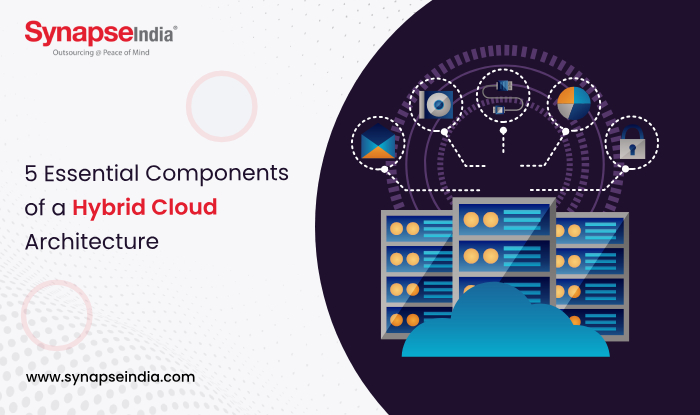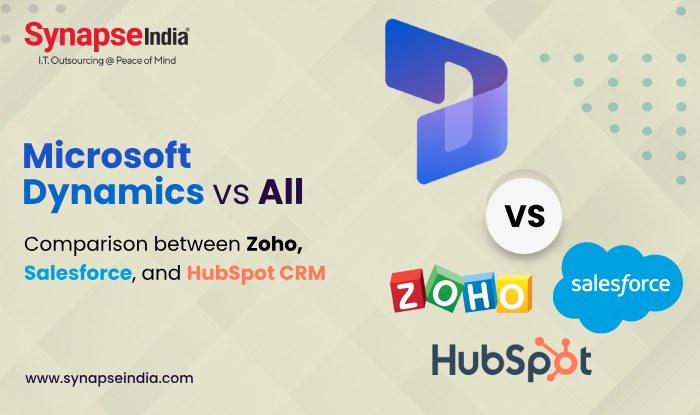 22 Apr 2024
22 Apr 2024
A hybrid cloud is defined as computing models that integrate with public cloud, private cloud, or on-premise infrastructure to run an organization’s applications and workload. Cloud computing has been on the rise ever since organizations clued in on its cost and maintenance advantages. Infrastructure as a service (lass) offerings such as Amazon's AWS and Microsoft’s Azure have become increasingly important while marking architectural decisions. Right after the pandemic the need and demand for scalable cloud solutions has increased to ensure business continuity. In this blog, we will explore some essential components of a hybrid cloud architecture and its background.
As already discussed above, hybrid combines and unifies public cloud and private cloud technology with on-premise infrastructure to create flexible, cost-optimal, and single IT infrastructure. However, different expectations and definitions are depending on what role you are coming from. A hybrid cloud has emerged as a powerful solution for organizations that are seeking to harness the benefits of private and public cloud environments. This innovative approach has combined to get flexibility and scalability using security that controls the private cloud. Hybrid cloud has its advantages which provide great considerations for business and provide insights into how organizations enhance their technology to drive more innovative ways to achieve their business objectives.

Hybrid cloud provides great advantages that help organizations get the most out of the on-prem infrastructure and cloud-based service. With hybrid cloud technology organizations get more flexibility in managing workloads and meeting the demands of the customers in the market, here are a few advantages:
With hybrid cloud architecture, businesses can use both public and private cloud resources according to their demands and specifications. Because of its adaptability, enterprises may scale their infrastructure up or down as needed to ensure cost-effectiveness and optimal resource usage.
Organizations may easily scale their IT resources to meet demand variations or accommodate growth with hybrid cloud architecture. Businesses can easily adapt to changing business needs by leveraging on-demand access to more computing, storage, and networking resources through the seamless integration of public and private cloud environments.
By maximizing resource consumption and utilizing the economic advantages of both public and private cloud environments, hybrid cloud architecture helps enterprises save money. Through dynamic workload allocation across several cloud platforms, enterprises may optimize operational efficiency and minimize infrastructure expenses. This is achieved by taking cost and performance factors into account.
With hybrid cloud architecture, businesses can take advantage of the public cloud's scalability and agility while still keeping more control over sensitive data and apps that are hosted on-site or in a private cloud.
Because hybrid cloud architecture allows data replication and backup across various cloud environments, it gives enterprises strong capabilities for disaster recovery and business continuity.
All things considered, hybrid cloud architecture provides businesses with an adaptable, scalable, and affordable way to update their IT infrastructure and advance digital transformation projects. Businesses may gain better agility, productivity, and creativity while retaining control over their vital data and applications by utilizing the finest features of both public and private cloud environments.

For specific workloads and applications, the public cloud component of a hybrid cloud architecture offers scalability, flexibility, and accessibility. It enables businesses to take advantage of the assets and services offered by cloud service providers such as Google Cloud Platform, AWS, and Azure.
The private cloud component provides improved security measures and specialized resources that are suited to certain business requirements. To ensure better control and compliance, it allows businesses to host sensitive data and mission-critical applications in-house or through outside suppliers of data centers.
In hybrid cloud designs, connectivity solutions are essential because they enable smooth data transfer and communication between public and private cloud environments. Data transmission is made safe and effective by technologies like hybrid cloud gateways, dedicated connections, and virtual private networks (VPNs).
Tools for orchestration and administration are crucial for workload optimization in hybrid cloud setups. By automating processes related to provisioning, scaling, monitoring, and management, these technologies help IT teams maintain consistent performance and manage resources effectively.
Hybrid cloud architectures must prioritize security and compliance measures to safeguard sensitive data and reduce the risks connected with multi-cloud environments. To protect data integrity and regulatory compliance, this includes powerful identity and access management (IAM), encryption, threat detection, and compliance monitoring capabilities.
Organizations may take advantage of the cloud's scalability, agility, and innovation while retaining control over sensitive data and guaranteeing industry compliance by incorporating five crucial elements into their hybrid cloud architecture.
For businesses looking to maximize their IT infrastructure and take benefits of cloud computing while keeping control over critical data and apps, hybrid cloud architecture is a great option. Businesses can increase their operational agility, efficiency, and creativity by implementing the five key elements: flexibility, scalability, cost savings, security and compliance, disaster recovery, and business continuity. Hybrid cloud architecture helps enterprises react to changing business requirements, lower infrastructure costs, and manage risks while maintaining high availability and resilience. It does this by seamlessly integrating public and private cloud environments. The use of hybrid cloud architecture will be essential to accelerating digital transformation and producing observable business results as enterprises continue to negotiate the complexity of contemporary IT environments.

 15 Jan 2024
15 Jan 2024
